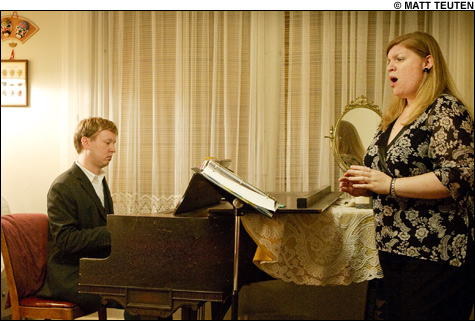
ARIA CODE: Christine Teeters sings with Boston Opera Collaborative. |
Perched on the lid of a lace-draped baby grand, a bobblehead quivers along with Christine Teeters's vibrato as she powers through a Tuesday-night voice lesson in the Steinway Piano Building on Boylston Street. Teeters and her younger sister, Rebecca, are Oklahoma natives, both music-school graduates (Christine, 29, from Boston Conservatory; Rebecca, 25, from New England Conservatory) pursuing careers as opera professionals. Their teacher, Kevin Wilson, is a faculty member of Boston Conservatory (and also a native of the Sooner State, who met Christine while they were students at the University of Central Oklahoma). Wilson's face is cherubic. His mouth, less so.
"You got to geweint and you shit the bed!" he laughs at Rebecca, who is struggling to wrap her lips around a phrase in a German aria.
"Technical term," Christine whispers.
Both Teeters sisters are sopranos, the most divalicious of voice parts, but so far, they've held sibling rivalry and general prima-donna conduct at bay. "We were at undergrad together for two years," says Christine. "We studied with the same teacher, we sang together in a few shows. We even shared the same role once. But it's kind of amazing — I get really excited for her. I've never felt terribly competitive. I've never lost out to her, but that might change soon. She's really coming into her own."
Coming into your own as a classical singer involves an extraordinary hustle and flow, a constant whirlwind of voice lessons, auditions all over the country, character and text interpretation, and applications to Young Artists Programs (YAPs) — highly competitive development and performance residences with professional opera companies — all in an effort to get that first juicy role under your belt, which can help lead to big breaks.
"It's a complicated cycle," says Christine. "You go to grad school, then you're supposed to get into a YAP. We, as singers, go through a year-long process to learn our 'pocket five' — five arias we can sing at the drop of a hat. Applications for YAPs cost a lot of money. You have to apply every year, sometimes to more than 40 programs. But these are things you have to get on your résumé."
Christine has yet to be accepted into a YAP.
"Two years ago, I would have said that there was nothing in Boston for young singers," she says. "Because of the economy, a lot of companies that people depended on for work, such as Cape Cod Opera, are shutting their doors. That's scary."
That cursed economy has many young professionals singing the blues, especially the soon-to-be-ex-students who will be greeted by a barren job market come commencement. And singers? Opera singers, looking to build a career in an art form that was already on life support before this whole international fiscal debacle? Most of them were already resigning themselves to a life of ramen noodles and financial sorrows before things reached rock bottom.
Despite all this, and perhaps because of it, the fat lady's forte is experiencing a local modern renaissance. After all, great art is born from great hardship. (The same can hardly be said about, say, financial services.) Rising up out of a shortage of professional performance opportunities and artists' programs, several small local opera outfits have emerged, including Boston Opera Collaborative, OperaHub, and Guerilla Opera. These renegade companies serve young singers and instrumentalists ("young" meaning generally under the age of 35, with a short résumé that may or may not include principal roles). Without the pressures of catering to an audience of lifelong upper-crust opera nerds, they are free to think outside the box seats and take theatrical risks. Case in point, OperaHub's 2008 collaboration with Juventas! New Music Ensemble for Tramps, E-mails, and Hemlock, a collection of new chamber operas that included an operatic homage to online romance.
Juventas! Blog Podcast
Soprano support
The Teeters sisters sing with Boston Opera Collaborative (BOC), which was founded in 2005 to address the lack of local performance opportunities for these still-developing singers.
Notes Roxanna Myhrum, vice-president of the nonprofit BOC, "A group of individuals came together and said, 'There's not a lot of opportunities for us here is this city, which we enjoy a lot. We came here for school. But now, what do we do for the next 10-year window, in which we anticipate growing our careers?' Our mission is to provide singers with performance opportunities and a support network to grow careers in Boston and all over New England."
Other companies have the same mission, which takes different forms. Last year, for example, OperaHub performed an "opera fashion show" at Saint, remixing opera to techno and performing while models strutted down a runway. "Our goal is to make opera exciting and energized and fresh," says Brittany Duncan, who performs with the company. "We want to make opera accessible artistically and financially. We don't have a stage — the action takes place in front of and around the audience, so the audience becomes part of the experience."